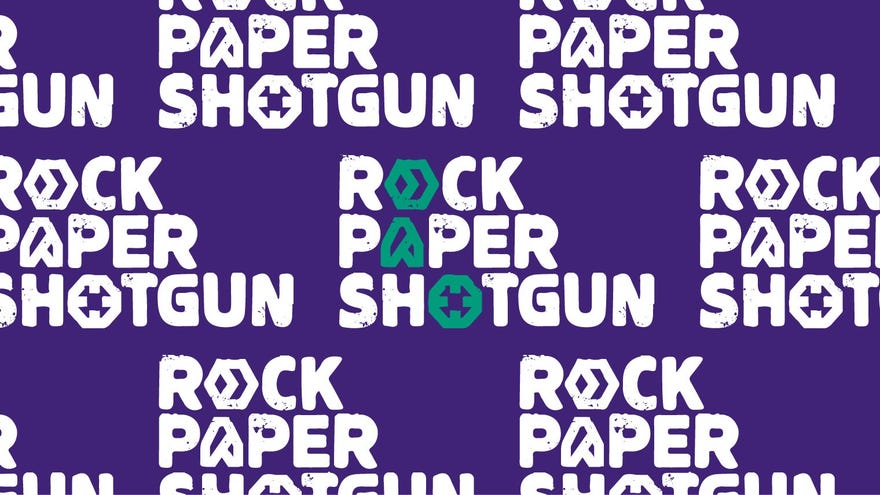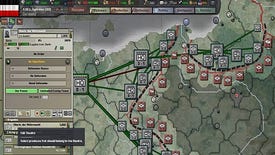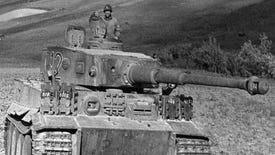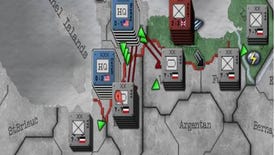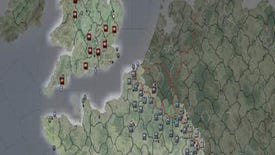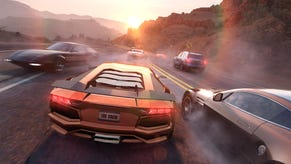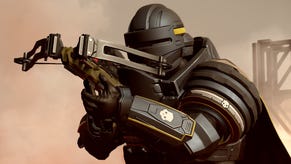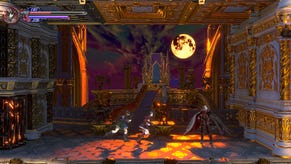Interview: Johan Andersson On Hearts Of Iron 3
The best way to learn about Paradox's rapidly approaching grand-strategy leviathan Hearts of Iron 3? Sit down with a gallon mug of tea and a family-size packet of custard creams and plough through the fascinating 30-part developer diary. If you've already done that, or don't have the patience/dunkable biscuitry to take on such a task, try the following Q&A in which Lead Designer and Man of History Johan Andersson fields questions on subjects as diverse as HoI3, gulags, and HoI3.
RPS: In the late nineties you went from making fluffy console games for Funcom to incredibly deep historical PC strategy for Paradox. What happened?
Johan: I was rather happy at Funcom, as I grew there from a rookie programmer to a lead programmer, while working on some really interesting games. However, as I always loved playing strategy games, I had this vision of one day making one myself. One day I saw an advert for programmers in my old hometown to work on a game called Europa Universalis. Since I owned the boardgame, it was an easy decision and I sent my CV there, and was hired within a week. Before the game was released, I was in charge of the project and have since then been doing this type of games.
RPS: Where did the interest in history come from?
Johan: I loved reading books and looking at maps as a child. History was the only subject in school that was close to storytelling, so it started there. Then I just kept reading and reading whenever I could, through all the libraries.
RPS: Most of the big names in strategy game design seem to have been weaned on Avalon Hill boardgames. What were your formative gaming influences?
Johan: I played lots and lots of Avalon Hill game as a teenager with my friends. We started with games like Diplomacy and Axis & Allies, but then spent an insane amount of time playing Advanced Civilization. I also spent those early teenage years making my own games on my c64, trying to hide that fact at school where I was trying to be oh so cool. I also spent a lot of time playing games like Pirates, Bards Tale III, Storm Across Europe and other similar classics.
RPS: Is coding still important to you or could you drift quite happily into a purely design role?
Johan: I'm currently in charge of the design process at Paradox, but we're a small outfit with an inhouse team of about eight to ten people working directly on the project. This means that the design tasks are not filling a full day, and since I know thing or two about programming, I tend to help out there as well. I don't think someone can do a good job being a pure designer on a game, as you never really understand the impact of your design until you actually develop them.
RPS: Would it be fair to describe HoI3 as a re-engineered HoI2? Reading the dev diaries I get the feeling you were basically happy with the scope and feel of HoI2, but felt that most aspects of it had room for improvement.
Johan: That is rather close to the truth. What we did was take our new Clausewitz engine, and then write a Hearts of Iron game on it, while taking into account all experiences we've had in making strategy games so far. We liked the scope of Hoi2, and feel that it was a really fine game for its time. The luxury of writing a sequel basically from scratch means that you can break down every feature in detail and even change their dependencies without major impacts on development.
RPS: You've quadrupled the number of provinces. Was that done purely to intimidate uninitiated reviewers and annoy your Chief Province Namer, or were there other reasons?
Johan: It was all because our marketing department's love of big numbers! No seriously, we thought a big increase in the number of provinces would increase the playability when it comes to the manoeuvre part of warfare. So far our testing has proven us right, and the game is much improved for that situation. Our researcher had to spend months designing the map and naming it though, so she may not have been entirely happy with that decision.
RPS: Was the shift to 3D a difficult decision?
Johan: No, it was a rather easy decision that I wish we had taken it earlier. Going 3d meant we could do another type of architecture where we could support more screen resolutions, and develop our maps in a quicker way. The biggest advantage from going 3d though was the ability to offload more to the GPU. With the machine advances during the last decade this gives us the biggest benefits in development when it comes to gameplay and AI.
RPS: Added elements like the command hierarchy and designer divisions are going to please a lot of grogs, but aren't you concerned this kind of detail will scare off newcomers?
Johan: That is a very good question. Can I get back to you with a good answer in about a year? I'm not sure it will scare away newcomers though, as I think detail never does. It is bad interfaces and/or lack of immediate fun that scare away new people from a game. We're focusing a lot of that, and I sincerely hope that we've done a good job.
RPS: Can you give a few examples of the improved AI? What kind of behaviours are we likely to see that we won't have seen before?
Johan: The AI will pursue strategic objectives, and make clear advances towards them along the front. The new delegation system will show this in detail.
RPS: That's a feature I'm really looking forward to trying. Let's say I hand over control of an entire theatre to an underling. How much shepherding will they need?
Johan: That depends entirely on you. You can give the AI control over units at any level from theatre down to single corps, and then just basically tell them their objectives and which stance they should take. Let's say you're playing Germany in 1944 and have two theatres, the west and the east. You could tell your eastern front HQ that Königsberg, Warsaw & Buchurest are the objectives, and it should be defensive. It will try to hold these objectives primarily, and maybe fall back instead of getting slaughtered.
RPS: How deep will HoI3 delve into the intelligence side of things? Will I be able to set up my own Bletchley Park or cultivate battlefield illusionists like Jasper Maskelyne?
Johan: It will not be possible to do such things. We do have different levels of fog of war, and different aspects of information you can get from your opponents. All of this depending on both technology and how much leadership you are willing to spend on espionage.
RPS: I trust I'll still be able to turn Costa Rica into a global superpower?
Johan: Eh, I doubt you'll be able to do that, unless you are really an expert and know how to abuse some cheats. It is much harder though than in the previous incarnations of the series, as some limitations have been added, like a manpower tax on your current mobilised troops as an example.
RPS: Have you purloined any ideas from mods like HSR or drawn from other Paradox creations like the Europa Universalis series?
Johan: I don't really play or follow many mods myself, but we usually take in experienced mod makers in our beta team. We also constantly reuse concept and learn from experiences in developing our other game-series. The outliner is something we first added into EU3, and have been something we've had in every game since then, as it's such a good improvement to the interface.
RPS: In your games I can send millions of my countrymen off to die in senseless wars and bomb enemies back to the stone age with nuclear weapons, but I can't use slave labour or set up gulags. Isn't there an inconsistency there?
Johan: Depends I guess. Violence and warfare is more of a socially accepted aspect to have in a game than slave labor.
RPS: AGEOD have a lot in common with Paradox. Do you regard them as competitors or compadres?
Johan: They make a different type of game than we do, as they focus more on operational games covering a limited period and map, with just a focus on fighting the actual war. With some better interfaces, I think they could get up to the same sales numbers as we have.
RPS: Any upcoming wargames you're particularly looking forward to playing?
Johan: To be honest, I do not really play all that many wargames in my spare time. I guess I get enough of that at the office. When I play games for fun, I play MMO's for the social aspect. However, I really think that East India Company will be something special, and I wish I had more time with it
RPS: What's next for Paradox?
Johan: New games? To be honest, I got no clue on what we'll do after HoI3, as no game design is written yet. Might be a Victoria 2 for all that I know...
RPS: Thanks Johan
Hearts of Iron 3 is due for release in August 2009
